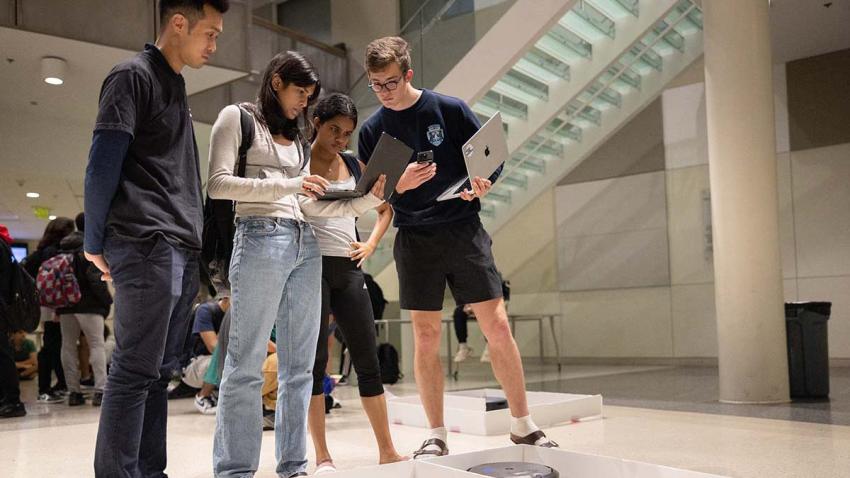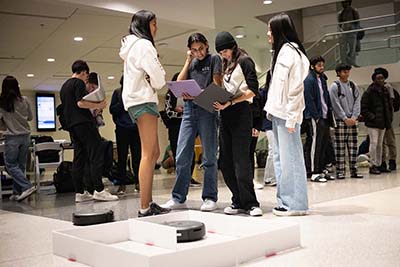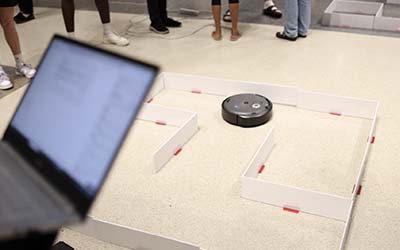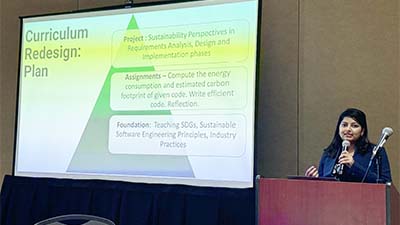
Empowering Teaching Excellence: SCI Leads Workshops at USG Teaching and Learning Conference
School of Computing Instruction (SCI) faculty, working with other Georgia Tech faculty, presented work on experiential learning, sustainable development and collaborative learning at the 2024 University System of Georgia (USG) Teaching and Learning Conference.
Experiential Learning in the Classroom
SCI’s Rodrigo Borela and his team spearheaded a workshop focused on integrating High Impact Practices (HIPs) into curricular activities to engage students.
HIPS have been tested and shown to benefit students from many backgrounds, engaging them in active learning and encouraging deep connections to their studies, peers, and communities. Some commonly recognized HIPs include:
- Capstone courses and projects
- Collaborative assignments and projects
- Common intellectual experiences
- Diversity / global learning
- E-Portfolios
- First-year seminars and experiences
- Internships
- Learning communities
- Service-learning / community-based learning
- Undergraduate research
- Writing-intensive courses
Experiential learning has been shown to lead to increased student engagement and retention. Through engaging activities and discussions, attendees gained practical insights into redesigning courses to incorporate experiential learning elements.
Project leads presented their initiatives as examples, showcasing practical methods for engaging students.

Rodrigo Borela highlighted the integration of robots in teaching coding, which has been shown to boost student confidence in programming.
“Students seeing a physical interpretation of their code using robots gave them a better grasp of programming concepts,” Borela said. “This process fostered both teamwork and problem-solving skills to prepare them for computer science curriculum and beyond.”

Additionally, School of Public Policy’s Stacey Doremus presented on co-constructing leadership rubrics with students; Scheller College of Business’ School of Economics’ Tatiana Rudchenko connected theory with practical applications in real-world operations management encounters; and Aselia Urmanbetova linked economics learning outcomes to student values.
Building Bridges Across the Curriculum
SCI’s Nimisha Roy and her team focused on aligning courses with the United Nations Sustainable Development Goals (SDGs). This workshop emphasized the importance of integrating SDGs in class to foster interdisciplinary collaboration and address pressing societal challenges.
They shared examples of SDG integration approaches across various course levels, from introductory to capstone courses. Attendees discussed ideas on how SDG teaching can enrich HIPS and cultivate skills like problem-solving and ethical reasoning.

Roy emphasized how integrating SDGs significantly elevated student engagement with sustainability in computer science courses. Students developed a deeper understanding of sustainability in daily technological practices and across various phases of software development. They also learned about sustainability strategies currently being adopted by leading tech companies.
“Through the redesigned frameworks of our software engineering and capstone courses, students have been equipped to practically weave sustainability into their software development processes, making these considerations a standard part of their professional toolkit,” Roy said.
“The students who participated in these redesigned courses displayed a stronger grasp and higher capability in incorporating sustainability into their assignments and projects than those who did not participate.”
The team’s workshop empowered participants to identify and incorporate relevant SDGs into their courses.
Other presenters and team members of Georgia Tech’s Community of Practice on Transformative Teaching with SDGs include Mirjana Milosevic Brockett, Zachary Handlos, Rebecca Watts Hull, Jennifer Leavey, Teresa Snow, Haley Steele, Christie Stewart, Howard Wertheimer, and Hongchen Wu.
Embracing Collaborative Learning
Both workshops exemplified the power of collaborative learning and educators left equipped with new tools, strategies, and insights to enhance their teaching practices.
The collaborative efforts showcased Georgia Tech's commitment to fostering transformative learning experiences and empowering educators across disciplines.
Information about upcoming USG Teaching and Learning Conferences can be found here.
As computing revolutionizes research in science and engineering disciplines and drives industry innovation, Georgia Tech leads the way, ranking as a top-tier destination for undergraduate computer science (CS) education. Read more about the college's commitment:… https://t.co/9e5udNwuuD pic.twitter.com/MZ6KU9gpF3
— Georgia Tech Computing (@gtcomputing) September 24, 2024


